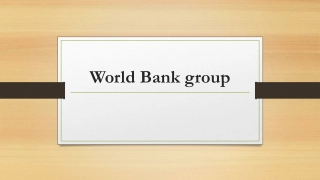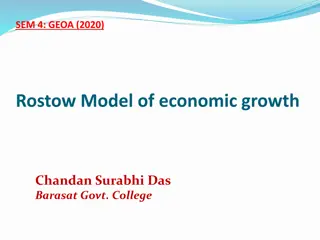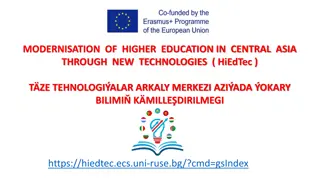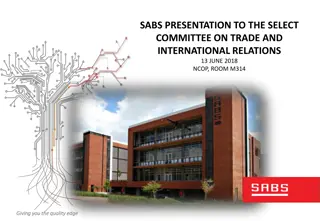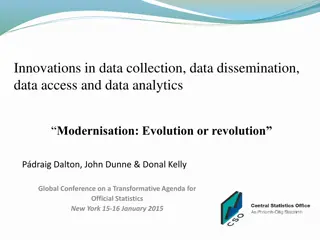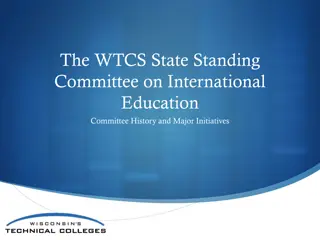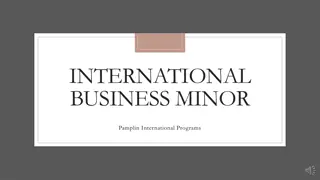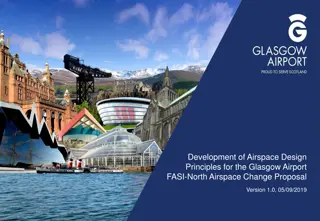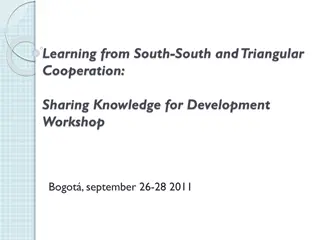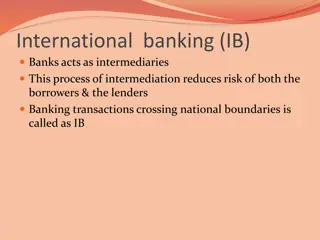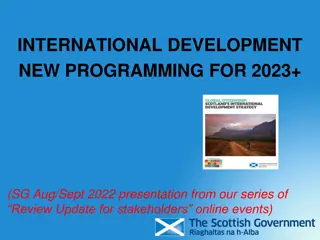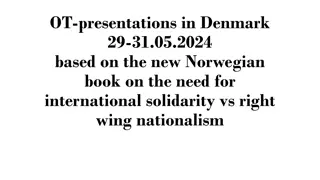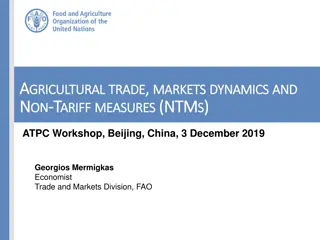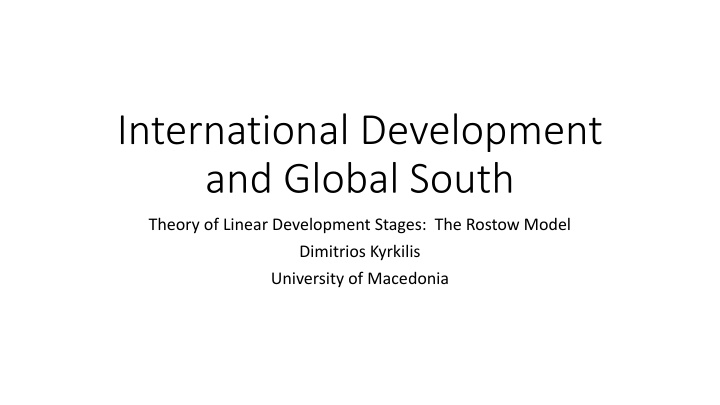
Theory of Modernization and Capitalist Development in International Development
Explore the Modernisation Theory and Capitalist Development in International Development, focusing on the Rostow Model, the modernisation process, and critiques of these theories. Understand how industrialization, urbanization, and democracy play roles in the development process.
Download Presentation

Please find below an Image/Link to download the presentation.
The content on the website is provided AS IS for your information and personal use only. It may not be sold, licensed, or shared on other websites without obtaining consent from the author. If you encounter any issues during the download, it is possible that the publisher has removed the file from their server.
You are allowed to download the files provided on this website for personal or commercial use, subject to the condition that they are used lawfully. All files are the property of their respective owners.
The content on the website is provided AS IS for your information and personal use only. It may not be sold, licensed, or shared on other websites without obtaining consent from the author.
E N D
Presentation Transcript
International Development and Global South Theory of Linear Development Stages: The Rostow Model Dimitrios Kyrkilis University of Macedonia
Modernisation Theory Modernisation Theory Modernisation refers to a theory which states that development in the developing world can be attained through following the processes of development that are used by currently developed nations(Rostow,1960). It usually highlights the positive role played by those countries that are developed in modernizing and facilitating sustainable development in those countries that are less developed. This means that for development to occur in underdeveloped countries there is need for developed countries provide aid to developing countries to enable them learn from their own progress. It looks at the state to be the central actor in bringing about modernization in societies that are backward. The theory also believes that underdeveloped countries could grow faster than developed countries and catch up and that it was possible for equal development to be reached between the underdeveloped and developed countries (Hollis and Robinson, 1986)
Modernisation process involves Modernisation process involves industrialization urbanization rationalization bureaucracy mass consumption the adoption of democracy Modernization theory holds that this process involves increased availability and levels of formal schooling, and the development of mass media, both of which are thought to foster democratic political institutions. Through the process of modernization, transportation and communication become increasingly sophisticated and accessible, populations become more urban and mobile, and the extended family declines in importance. Simultaneously, the importance of the individual in economic and social life increases and intensifies.
Capitalist Development Capitalist Development Organisations become bureaucratic as the dividion of labour within society grows more complex, and as it is a process rooted in scientific and technological rationality, religion declines in public life. Lastly, markets prevail as the primary mechanism through which goods and services are exchanged. As it is a theory conceptualized by Western social scientists, it is also one with a capitalust economy at its centre. Cemented as valid within Western academia, modernization theory has long been used as a justification for implementing the same kinds of processes and structures in places all over the world that are considered "under-" or "undeveloped" as compared with Western societies. At its core are the assumptions that scientific progress, technological development and rationality, mobility, and economic growth are good things and are to be constantly aimed for.
Critiques Critiques Many scholars, especialy of the postcolonial theiry pointed out that modernisation theory fails to account for the way Western reliance on colonisation, slave labour, and theft of land and resources provided the wealth and material resources necessary for the pace and scale of development in the West. It cannot be replicated in other places because of this, and it should not be replicated in this way, these critics argue. Others, such as the Frsnkfurt School and critical theorists at large, have pointed out that Western modernisation is premised on the extreme exploitation of workers within the capitalist system, and that the toll of modernization on social relations has been great, leading to widespread social alienation, a loss of community, and unhappiness. Others criticise modernisation theory for failing to account for the unsustainable nature of the project, in an environmental sense, and point out that pre-modern, traditional, and indigenous cultures typically had much more environmentally conscious and symbiotic relationships between people and the planet. Some point out that elements and values of traditional life need not be completely erased in order to achieve a modern society, pointing to Japan as an example.
Walt Rostow Walt Rostow The son of Russian Jewish immigrants in New York, Walt Whitman Rostow obtained his Ph.D. At Yale in 1939 (with a stint as a Rhodes scholar at Oxford in between). Rostow subsequently served as an economics instructor at Columbia until the outbreak of the war. During WWII, Rostow served as an officer in the OSS (ancestral to the CIA) in Washington. He returned to academia after the war. After brief periods at Oxford in 1946 and Cambridge in 1949, Rostow became professor of economic history at MIT in 1950. Rostow became a political adviser to the US presidents John F. Kennedy and Lyndon B. Johnson. After serving as Kennedy's campaign strategist in 1960, Rostow became a state department official and later national security adviser during the Vietnam War, and was reputedly instrumental in increasing US military involvement there. He later taught at the University of Texas at Austin.
Rostow believed economic development was a universal process that would generally occur in all countries albeit with unique national characteristics that is, except under communism, where he believed the process would be much inhibited. He described communism as a cancer of economic development. Communism, therefore, had to be forcefully resisted to protect a given country s economic prosperity and freedoms and, ultimately, American national security and well-being as well. The political motivation behind his academic work becomes obvious from the subtitle he had put to his original paper A non communist manifesto .
Walt Rostow postulated a five stage model of development that will be able to apply to all the countries. This model was vital in the sense that it is concerned with the idea that a country is able to develop economically by focusing on the resources that are in short supply in order to expand beyond local industries to reach global market and finance the country s further development to bring about economic growth ( Todaro and Smith,2003 Rostows stages of economic development are very important in the sense that every society supposed to go through all the five stages of development. These stages or transition periods happen at varying lengths from country to country and even from region to region. They are important in the sense that they foster economic self reliance for the development of all sectors to bring about modernization. Education is also considered to be a pre requisite of the development of any society.
Walt Rostow took a historical approach in suggesting that developed countries have tended to pass through 5 stages to reach their current degree of economic development.
Stage 1:Traditional Society Stage 1:Traditional Society Traditional society is characterised by: subsistence agriculture or hunting & gathering; almost wholly a "primary" sector economy, limited technology, a static or 'rigid' society: lack of class or individual economic mobility, with stability prioritised and change seen negatively.
Stage 2: Preconditions to Take Stage 2: Preconditions to Take- -off off In this stage: external demand for raw materials initiates economic change; development of more productive, commercial agriculture & cash crops not consumed by producers and/or largely exported; widespread and enhanced investment in changes to the physical environment to expand production (i.e. irrigation, canals, ports) increasing spread of technology & advances in existing technologies; changing social structure, with previous social equilibrium now in flux; individual social mobility begins; development of national identity and shared economic interests.
Stage 3: Take off Stage 3: Take off In the Take off stage: Urbanization increases, Industrialization proceeds, Technological break through occurs; the "secondary" (goods-producing) sector expands and ratio of secondary vs. primary sectors in the economy shifts quickly towards secondary; textiles & apparel are usually the first "take-off" industry, as happened in Great Britain's classic "Industrial Revolution .
Stage 4: Drive to Maturity Stage 4: Drive to Maturity During the drive to maturity stage of development economies show: Diversification of the industrial base; multiple industries expand & new ones take root quickly. Manufacturing shifts from investment-driven (capital goods) towards consumer durables & domestic consumption. Rapid development of transportation infrastructure. Large-scale investment in social infrastructure (schools, universities, hospitals, etc.)
Stage 5: Age of Mass Consumption Stage 5: Age of Mass Consumption In the age of mass consumption the industrial base dominates the economy; the primary sector is of greatly diminished weight in economy & society; widespread and normative consumption of high-value consumer goods (e.g. automobiles) consumers typically (if not universally), have disposable income, beyond all basic needs, for additional goods.
Is there a sixth stage? Is there a sixth stage? Later in 1971 Rostow published a book titled Politics and the Stages of Growth by Cambridge University Press. He introduced a sixth stage of development named In search of quality or beyond mass consumption. Individuals begin having larger families and do not value income as a pre- requisite for more vacation days. Consumer products become more durable and more diverse. New Americans will behave in a way where the high economic security and level mass consumption is considered normal. Rostow does make the point that it is possible with the large baby boom it could either cause economic issues or dictate an even larger diffusion of consumer goods. With increasing urban and suburban population there will be undoubtedly an increase in consumer goods and services as well. This sixth stage much later i the 1990 other scholars, e.g. John Dunning, Ozawa, etc described as the stage of the services and high tech economies.
Rostow argued that economic take-off must initially be led by a few individual economic sectors. This belief echoes David Ricardo s comparative advantages thedis, it criticises economic self-reliance that pushes for the development of all sectors equally. Rostow's model lays emphasis on the efficacy of modern concepts of free trade and the ideas of Adam Smith. It disagrees with Friedrich List's argument which states that economies which rely on exports of raw materials may get "locked in", and would not be able to diversify. Ristiw s model regards that economies may need to depend on raw material exports to finance the development of industrial sector which has not yet of achieved superior level of competitiveness in the early stages of take-off. Rostow's model does not disagree with Keynes thesis of the importance of government control over domestic development. The basic assumption given by Rostow is that countries want to modernize and grow and that society will agree to the materialistic norms of economic growth.
Influential Model Influential Model Rostow s model has been one of the most influential development models in the postwar period followed by a nunber of countries. Industrialisation, urbanisation, and trade are the main elements of the model still seen by many as a roadmap for a country's development. Singapore is one of the best examples of a country that grew in this way and is now a notable player in the global economy. Singapore is a southeast Asian country with a population of over 5 million, and when it became independent in 1965, it did not seem to have any exceptional prospects for growth. However, it industrialised early, developing profitable manufacturing and high-tech industries. Singapore is now highly urbanized, with 100% of the population considered "urban. It is one of the most sought-after trade partners in the international market, with a higher per-capita income than many European countries.
South Korea South Korea In South Korea, at the time a Third World nation, much interest in Rostow's book was expressed by both economists and policy-makers. Rostow's concept of "economic take-off" especially appealed to the South Korean president, General Park Chung-hee, who often used that phrase in his speeches calling for South Koreans to work harder so that their nation could rise up to a First World economy. Park, who seized power in a 1961 coup d' tat, starting in 1962 inaugurated a policy of five year plans under which the South Korean chaebol had to meet certain targets set by the government as part of the push to reach the "economic take-off" stage. A 1969 book Theory and Condition of Korean Economic Development published by the government had 17 essays by leading economists, of which half described sought to apply the theories set out in The Stages of Economic Growth to South Korea.
Newly Industrialised Countries (NICs) Newly Industrialised Countries (NICs) Rostow s ideas are behind industrialisation in Southeast Asia initially by the four tigers i.e. Singapore, S. Korea, Taiwan, and Hong Kong that started in late 60 s and early70 s and later by countries duch as Mexico, Argentina,Brasil, S. Africa, Turkey, Thailand, Malaysia, India, China, and Russia. Their development paths share some common features. Those include political and economic reforms allowing for greater market liberalization, strengthening of the legal and economic environment to foster increased competition and privatisation of industries, and trade liberalization policies allowing increased exchange of goods and cross-border investment. In some there is a tendencg towards democracy and mire civil rights.
Criticisms of Rostows Model Criticisms of Rostow s Model While Rostow illustrates faith in a capitalist system, scholars have criticized his bias towards a western model as the only path towards development. Rostow lays out five succinct steps towards development and critics have cited that all countries do not develop in such a linear fashion; some skip steps or take different paths. Rostow's theory can be classified as "top-down," or one that emphasizes a trickle-down modernization effect from urban industry and western influence to develop a country as a whole. Later theorists have challenged this approach, emphasising a "bottom-up" development paradigm, in which countries become self-sufficient through local efforts, and urban industry is not necessary. Rostow also assumes that all countries have a desire to develop in the same way, with the end goal of high mass consumption, disregarding the diversity of priorities that each society holds and different measures of development. For example, while Singapore is one of the most economically prosperous countries, has one of the highest income disparities in the world. Finally, Rostow disregards one of the most fundamental geographical principals: site and situation. Rostow assumes that all countries have an equal chance to develop, without regard to population size, natural resources, or location. Singapore, for instance, has one of the world's busiest trading ports, but this would not be possible without its advantageous geography as an island nation between Indonesia and Malaysia. In spite of the many critiques of Rostow's model, it is still one of the most widely cited development theories and is a primary example of the intersection of geography, economics, and politics.
For a critical review of Rostows theory see: https://www.theguardian.com/global-development/2012/oct/08/us- economist-walt-rostow-development

